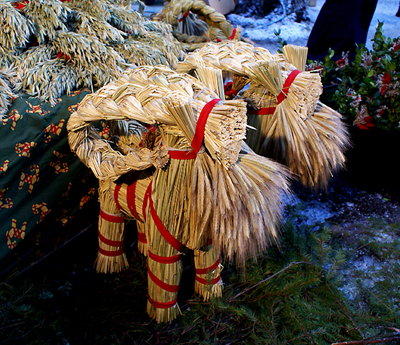Julbocken and Other News Posted by Transparent Language on Dec 21, 2008 in Culture
I received several emails from the readers asking me what I thought about the riots in Malmö. So, what did I think about the riots? Absolutely nothing. It barely registered on our radars here in Norrland. Much more exciting news is that Lindex is going to open a store in Lycksele next year – at least I know that Ceci will appreciate it, as she’ll be heading to Lycksele next spring.
Another important news is that as of December 15, 2008 people from outside the EU can come to Sweden for a limited time and look for a job. Especially needed are medical professionals, engineers, and other highly qualified people. But it’s a catch-22 situation, really. Most new arrivals don’t speak Swedish and to get a job in those highly specialized fields good Swedish skills are essential. Some say it’s really odd that Sweden is opening its job market when the unemployment rates are soaring and companies are going bankrupt.
But let’s return to Lyckselse for a moment. The Lycksele goat was set on fire last Friday.
No worries, it wasn’t a live goat, only a straw one. And it wasn’t as big as the most famous Christmas goat erected every year in Gävle. Normally, it’s the Gävle goat that gets torched, but this year its northern cousin has been burned.
Gävlebocken 2006. Image: Wikipedia.
“A Christmas goat?” I hear you say. Yep. Julbocken. It’s a leftover from the old pagan tradition where the god Thor used to ride in a chariot drawn by two goats, Tanngrisnir and Tanngnjóstr. (I mean, goats? A chariot? And here I thought that Thor was a fierce and important god.)
But that’s how the tradition of straw goats had originated. Some towns, like Gävle and Lycksele, construct their own massive straw goats, which is just an invitation for crazy pyromaniacs to set them on fire. But if you want your very own straw goat, you can buy yourself a miniature version. They’re sold almost everywhere before Christmas, from simple ones at julmarknader to more fancy versions at normal shops.

Straw goats at julmarknad in Umeå last year.
So, in Sweden, Christmas means a straw goat and Donald Duck on tv. But we’ll talk about Donald Duck on Christmas eve next time.

Build vocabulary, practice pronunciation, and more with Transparent Language Online. Available anytime, anywhere, on any device.




Comments:
Luke (Sydney):
Hej Ana, actually one thing interested me about Sweden is that she might still preserved some paganism for being far away from Rome (no offense). As why goats? (cough!) it’s just an old old symbol being passed on thru thousands thousands of years that gaining its divine status. Some believe that it was women started farming (small) animals as strong male hunters would just have roasted them lol
Anna:
Luke, you’re absolutely right! The men would just eat the goat! LOL! 🙂
David from Oregon:
Assuming Gävlebocken is not destroyed beforehand by some idiot, what is the ultimate fate of Gävlebocken? I mean do they make a big bonfire of it on a particular day in some kind of celebration or does it just stand there until it decays away?
Anna:
Hi David,
that is a very good question indeed. And in my northern ignorance I’ve never thought about it before. I will try to find out tomorrow.
Linda:
Hej! In regards to the Gävlebocken, usually if it hasn’t been destroyed a few days after it’s put together, they take it apart and reuse the shell for the next Christmas. This information I got from my husband who is from Gävle. Hope that helped.